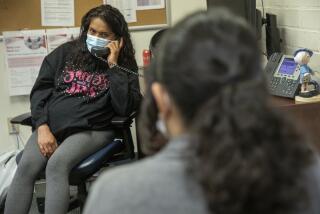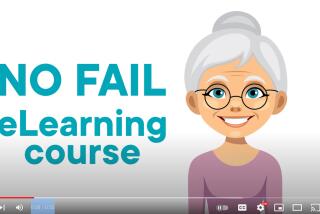Disabled Motorists Praise Car Phone Program
Unable to walk very far because of multiple sclerosis, Rebecca Maxwell of Port Hueneme was virtually stranded after her car broke down three years ago on a freeway shoulder.
Only after a good Samaritan pulled over and gave her a lift was the 37-year-old woman able to leave the dangerous shoulder.
It is a predicament that long haunted Phyllis Ellis of Thousand Oaks as well.
“You don’t know when something’s going to happen,” said Ellis, 67, who uses a wheelchair because of post-polio syndrome. “If I (did) break down . . . I would be at everybody’s mercy on the freeway.”
But for Ellis, Maxwell and 233 other disabled motorists in Ventura County, the situation has changed dramatically.
Since July, 1993, the county Transportation Commission has spent about $70,000 to distribute portable telephones to physically disabled motorists who, in response to a recent survey, have given glowing praise to the only program of its kind in California. The free cellular phones enable those who cannot readily use roadside call boxes to instead call 911 from their cars.
“This service saved my life by giving me freedom to go out of the house and feel secure and safe,” an anonymous respondent wrote to the commission.
“The phone is like insurance,” another wrote. “You hope you never need it but it’s reassuring to have it.”
To pay for the program, the county assesses drivers a $1 vehicle registration surcharge whose funds are earmarked for call boxes and other emergency highway services.
“It’s proven to be a program that isn’t terrible costly and is very easy to administer,” program manager Christopher Stephens said. “It didn’t create another bureaucracy.”
Since circulating its questionnaire in September, the Transportation Commission has received about 160 responses from disabled recipients throughout the county. More than 20% indicated they had used their phones to seek personal roadside assistance. Another 20% called 911 to report incidents or emergencies they had witnessed while driving.
As many people used the phones within the county as beyond its limits, particularly in the San Fernando Valley, Agoura Hills and other Los Angeles County communities.
“The overwhelming response is tremendously positive,” said commission Executive Director Ginger Gherardi, whose agency instituted the program to conform to what the county sees as the spirit of the 1990 Americans With Disabilities Act.
The federal law, whose specific applications are still being debated, mandates that people with disabilities be able to use transportation services that are available to the general public. But whether such services include call boxes is not yet clear, Stephens said.
“Regardless of how it shakes out, we will have had a program in Ventura County that has been helping people for a number of years,” he added.
The cellular phones, which cost the commission about $275 each, are available only to disabled motorists who live in Ventura County and can be used only to call 911, unless the user pays for more extensive service. About 10 are distributed each month by the Transportation Commission.
Ventura resident Martin Heyneman, 43, who uses a wheelchair 80% of the time because of multiple sclerosis, said cellular phones are vital because cars typically break down so far from call boxes that most disabled people could not reach them.
Maxwell, who now uses a wheelchair, said of her cellular phone, “I don’t know what I’d do without it. It’s extremely helpful.”
She added that she has twice used the portable phone, once to call for help when her car would not start and another time to call emergency crews to remove a stalled vehicle that blocked traffic on a Ventura street.
More to Read
Sign up for Essential California
The most important California stories and recommendations in your inbox every morning.
You may occasionally receive promotional content from the Los Angeles Times.










